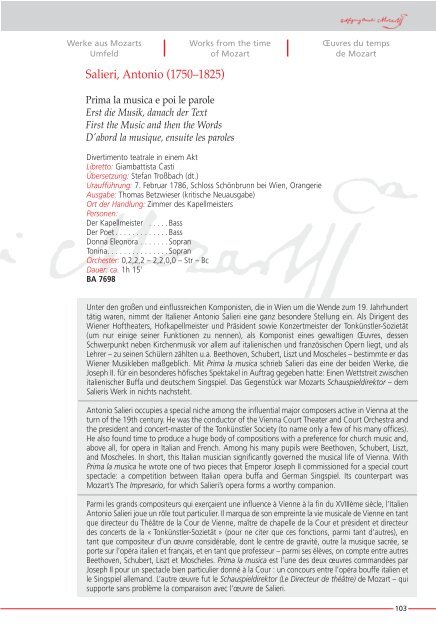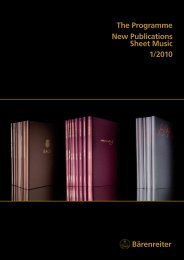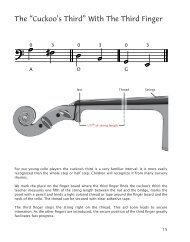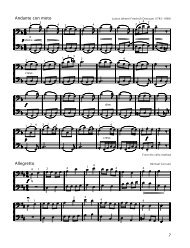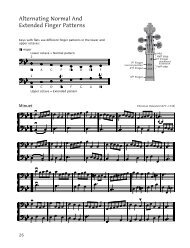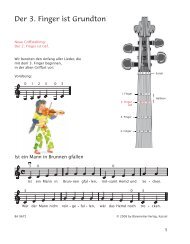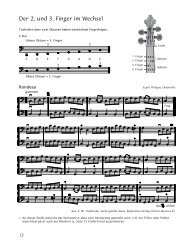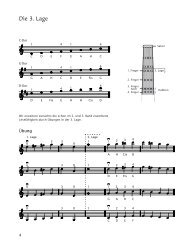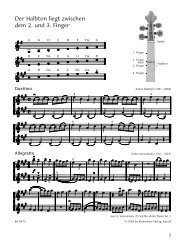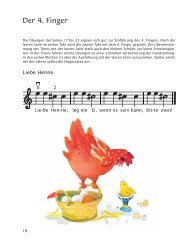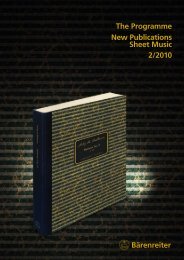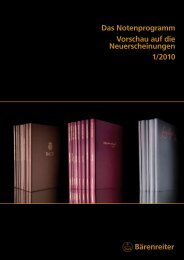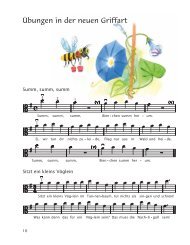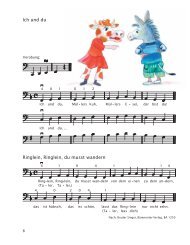You also want an ePaper? Increase the reach of your titles
YUMPU automatically turns print PDFs into web optimized ePapers that Google loves.
<strong>Werke</strong> aus Mozarts<br />
Umfeld<br />
Salieri, Antonio (1750–1825)<br />
Works from the time<br />
of Mozart<br />
Prima la musica e poi le parole<br />
Erst die Musik, danach der Text<br />
First the Music and then the Words<br />
D'abord la musique, ensuite les paroles<br />
Divertimento teatrale in einem Akt<br />
Libretto: Giambattista Casti<br />
Übersetzung: Stefan Troßbach (dt.)<br />
Uraufführung: 7. Februar 1786, Schloss Schönbrunn bei Wien, Orangerie<br />
Ausgabe: Thomas Betzwieser (kritische Neuausgabe)<br />
Ort der Handlung: Zimmer des Kapellmeisters<br />
Personen:<br />
Der Kapellmeister . . . . . Bass<br />
Der Poet . . . . . . . . . . . . . Bass<br />
Donna Eleonora . . . . . . . Sopran<br />
Tonina . . . . . . . . . . . . . . . Sopran<br />
Orchester: 0,2,2,2 – 2,2,0,0 – Str – Bc<br />
Dauer: ca. 1h 15‘<br />
BA 7698<br />
Œuvres du temps<br />
de Mozart<br />
Unter den <strong>groß</strong>en und einflussreichen Komponisten, die in Wien um die Wende zum 19. Jahrhundert<br />
tätig waren, nimmt der Italiener Antonio Salieri eine ganz besondere Stellung ein. Als Dirigent des<br />
Wiener Hoftheaters, Hofkapellmeister und Präsident sowie Konzertmeister der Tonkünstler- Sozietät<br />
(um nur einige seiner Funktionen zu nennen), als Komponist eines gewaltigen Œuvres, dessen<br />
Schwerpunkt neben Kirchenmusik vor allem auf italienischen und französischen Opern liegt, und als<br />
Lehrer – zu seinen Schülern zählten u.a. Beethoven, Schubert, Liszt und Moscheles – bestimmte er das<br />
Wiener Musikleben maßgeblich. Mit Prima la musica schrieb Salieri das eine der beiden <strong>Werke</strong>, die<br />
Joseph II. für ein besonderes höfisches Spektakel in Auftrag gegeben hatte: Einen Wettstreit zwischen<br />
italienischer Buffa und deutschem Singspiel. Das Gegenstück war Mozarts Schauspieldirektor – dem<br />
Salieris Werk in nichts nachsteht.<br />
Antonio Salieri occupies a special niche among the influential major composers active in Vienna at the<br />
turn of the 19th century. He was the conductor of the Vienna Court Theater and Court Orchestra and<br />
the president and concert-master of the Tonkünstler Society (to name only a few of his many offices).<br />
He also found time to produce a huge body of compositions with a preference for church music and,<br />
above all, for opera in Italian and French. Among his many pupils were Beethoven, Schubert, Liszt,<br />
and Moscheles. In short, this Italian musician significantly governed the musical life of Vienna. With<br />
Prima la musica he wrote one of two pieces that Emperor Joseph II commissioned for a special court<br />
spectacle: a competition between Italian opera buffa and German Singspiel. Its counterpart was<br />
Mozart’s The Impresario, for which Salieri’s opera forms a worthy companion.<br />
Parmi les grands compositeurs qui exerçaient une influence à Vienne à la fin du XVIIIème siècle, l’Italien<br />
Antonio Salieri joue un rôle tout particulier. Il marqua de son empreinte la vie musicale de Vienne en tant<br />
que directeur du Théâtre de la Cour de Vienne, maître de chapelle de la Cour et président et directeur<br />
des concerts de la « Tonkünstler-Sozietät » (pour ne citer que ces fonctions, parmi tant d’autres), en<br />
tant que compositeur d’un œuvre considérable, dont le centre de gravité, outre la musique sacrée, se<br />
porte sur l’opéra italien et français, et en tant que professeur – parmi ses élèves, on compte entre autres<br />
Beethoven, Schubert, Liszt et Moscheles. Prima la musica est l’une des deux œuvres commandées par<br />
Joseph II pour un spectacle bien particulier donné à la Cour : un concours entre l’opéra bouffe italien et<br />
le Singspiel allemand. L’autre œuvre fut le Schauspieldirektor (Le Directeur de théâtre) de Mozart – qui<br />
supporte sans problème la comparaison avec l’œuvre de Salieri.<br />
103


